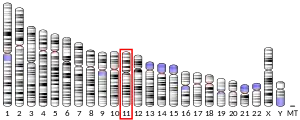Structure specific recognition protein 1
FACT complex subunit SSRP1 also known as structure specific recognition protein 1 is a protein that in humans is encoded by the SSRP1 gene.[5]
Function
The protein encoded by this gene is a subunit of a heterodimer that, along with SUPT16H, forms chromatin transcriptional elongation factor FACT. FACT interacts specifically with histones H2A/H2B to effect nucleosome disassembly and transcription elongation. FACT and cisplatin-damaged DNA may be crucial to the anticancer mechanism of cisplatin. This encoded protein contains a high mobility group box which most likely constitutes the structure recognition element for cisplatin-modified DNA. This protein also functions as a co-activator of the transcriptional activator p63.[5]
Interactions
Structure specific recognition protein 1 has been shown to interact with NEK9.[6] SSRP1 further interacts with transcriptional activator p63.[7] SSRP1 enhances the activity of full-length p63, but it has no effect on the N-terminus-deleted p63 (DeltaN-p63) variant.
References
- GRCh38: Ensembl release 89: ENSG00000149136 - Ensembl, May 2017
- GRCm38: Ensembl release 89: ENSMUSG00000027067 - Ensembl, May 2017
- "Human PubMed Reference:". National Center for Biotechnology Information, U.S. National Library of Medicine.
- "Mouse PubMed Reference:". National Center for Biotechnology Information, U.S. National Library of Medicine.
- "Entrez Gene: SSRP1 structure specific recognition protein 1".
- Tan BC, Lee SC (Mar 2004). "Nek9, a novel FACT-associated protein, modulates interphase progression". J. Biol. Chem. 279 (10): 9321–30. doi:10.1074/jbc.M311477200. PMID 14660563.
- Zeng SX, Dai MS, Keller DM, Lu H (15 Oct 2002). "SSRP1 functions as a co-activator of the transcriptional activator p63". EMBO J. 21 (20): 5487–97. doi:10.1093/emboj/cdf540. PMC 129072. PMID 12374749.
Further reading
- Bruhn SL, Pil PM, Essigmann JM, Housman DE, Lippard SJ (1992). "Isolation and characterization of human cDNA clones encoding a high mobility group box protein that recognizes structural distortions to DNA caused by binding of the anticancer agent cisplatin". Proc. Natl. Acad. Sci. U.S.A. 89 (6): 2307–11. Bibcode:1992PNAS...89.2307B. doi:10.1073/pnas.89.6.2307. PMC 48646. PMID 1372440.
- Toney JH, Donahue BA, Kellett PJ, Bruhn SL, Essigmann JM, Lippard SJ (1989). "Isolation of cDNAs encoding a human protein that binds selectively to DNA modified by the anticancer drug cis-diamminedichloroplatinum(II)". Proc. Natl. Acad. Sci. U.S.A. 86 (21): 8328–32. Bibcode:1989PNAS...86.8328T. doi:10.1073/pnas.86.21.8328. PMC 298274. PMID 2530581.
- Nagulapalli S, Pongubala JM, Atchison ML (1995). "Multiple proteins physically interact with PU.1. Transcriptional synergy with NF-IL6 beta (C/EBP delta, CRP3)". J. Immunol. 155 (9): 4330–8. PMID 7594592.
- Orphanides G, LeRoy G, Chang CH, Luse DS, Reinberg D (1998). "FACT, a factor that facilitates transcript elongation through nucleosomes". Cell. 92 (1): 105–16. doi:10.1016/S0092-8674(00)80903-4. PMID 9489704. S2CID 11248520.
- Dyer MA, Hayes PJ, Baron MH (1998). "The HMG domain protein SSRP1/PREIIBF is involved in activation of the human embryonic beta-like globin gene". Mol. Cell. Biol. 18 (5): 2617–28. doi:10.1128/MCB.18.5.2617. PMC 110641. PMID 9566881.
- LeRoy G, Orphanides G, Lane WS, Reinberg D (1998). "Requirement of RSF and FACT for transcription of chromatin templates in vitro". Science. 282 (5395): 1900–4. doi:10.1126/science.282.5395.1900. PMID 9836642.
- Kelley DE, Stokes DG, Perry RP (1999). "CHD1 interacts with SSRP1 and depends on both its chromodomain and its ATPase/helicase-like domain for proper association with chromatin". Chromosoma. 108 (1): 10–25. doi:10.1007/s004120050347. PMID 10199952. S2CID 12945778.
- Spencer JA, Baron MH, Olson EN (1999). "Cooperative transcriptional activation by serum response factor and the high mobility group protein SSRP1". J. Biol. Chem. 274 (22): 15686–93. doi:10.1074/jbc.274.22.15686. PMID 10336466.
- Orphanides G, Wu WH, Lane WS, Hampsey M, Reinberg D (1999). "The chromatin-specific transcription elongation factor FACT comprises human SPT16 and SSRP1 proteins". Nature. 400 (6741): 284–8. Bibcode:1999Natur.400..284O. doi:10.1038/22350. PMID 10421373. S2CID 4300397.
- Wada T, Orphanides G, Hasegawa J, Kim DK, Shima D, Yamaguchi Y, Fukuda A, Hisatake K, Oh S, Reinberg D, Handa H (2000). "FACT relieves DSIF/NELF-mediated inhibition of transcriptional elongation and reveals functional differences between P-TEFb and TFIIH". Mol. Cell. 5 (6): 1067–72. doi:10.1016/S1097-2765(00)80272-5. PMID 10912001.
- Keller DM, Zeng X, Wang Y, Zhang QH, Kapoor M, Shu H, Goodman R, Lozano G, Zhao Y, Lu H (2001). "A DNA damage-induced p53 serine 392 kinase complex contains CK2, hSpt16, and SSRP1". Mol. Cell. 7 (2): 283–92. doi:10.1016/S1097-2765(01)00176-9. PMID 11239457.
- Yarnell AT, Oh S, Reinberg D, Lippard SJ (2001). "Interaction of FACT, SSRP1, and the high mobility group (HMG) domain of SSRP1 with DNA damaged by the anticancer drug cisplatin". J. Biol. Chem. 276 (28): 25736–41. doi:10.1074/jbc.M101208200. PMID 11344167.
- Santoro P, De Andrea M, Migliaretti G, Trapani C, Landolfo S, Gariglio M (2002). "High prevalence of autoantibodies against the nuclear high mobility group (HMG) protein SSRP1 in sera from patients with systemic lupus erythematosus, but not other rheumatic diseases". J. Rheumatol. 29 (1): 90–3. PMID 11824977.
- Roig J, Mikhailov A, Belham C, Avruch J (2002). "Nercc1, a mammalian NIMA-family kinase, binds the Ran GTPase and regulates mitotic progression". Genes Dev. 16 (13): 1640–58. doi:10.1101/gad.972202. PMC 186374. PMID 12101123.
- Zeng SX, Dai MS, Keller DM, Lu H (2002). "SSRP1 functions as a co-activator of the transcriptional activator p63". EMBO J. 21 (20): 5487–97. doi:10.1093/emboj/cdf540. PMC 129072. PMID 12374749.
- Keller DM, Lu H (2003). "p53 serine 392 phosphorylation increases after UV through induction of the assembly of the CK2.hSPT16.SSRP1 complex". J. Biol. Chem. 277 (51): 50206–13. doi:10.1074/jbc.M209820200. PMID 12393879.
- Belotserkovskaya R, Oh S, Bondarenko VA, Orphanides G, Studitsky VM, Reinberg D (2003). "FACT facilitates transcription-dependent nucleosome alteration". Science. 301 (5636): 1090–3. Bibcode:2003Sci...301.1090B. doi:10.1126/science.1085703. PMID 12934006. S2CID 26667338.
- Li J, Hawkins IC, Harvey CD, Jennings JL, Link AJ, Patton JG (2003). "Regulation of alternative splicing by SRrp86 and its interacting proteins". Mol. Cell. Biol. 23 (21): 7437–47. doi:10.1128/MCB.23.21.7437-7447.2003. PMC 207616. PMID 14559993.
- Tan BC, Lee SC (2004). "Nek9, a novel FACT-associated protein, modulates interphase progression". J. Biol. Chem. 279 (10): 9321–30. doi:10.1074/jbc.M311477200. PMID 14660563.
External links
- SSRP1+protein,+human at the U.S. National Library of Medicine Medical Subject Headings (MeSH)
This article incorporates text from the United States National Library of Medicine, which is in the public domain.





